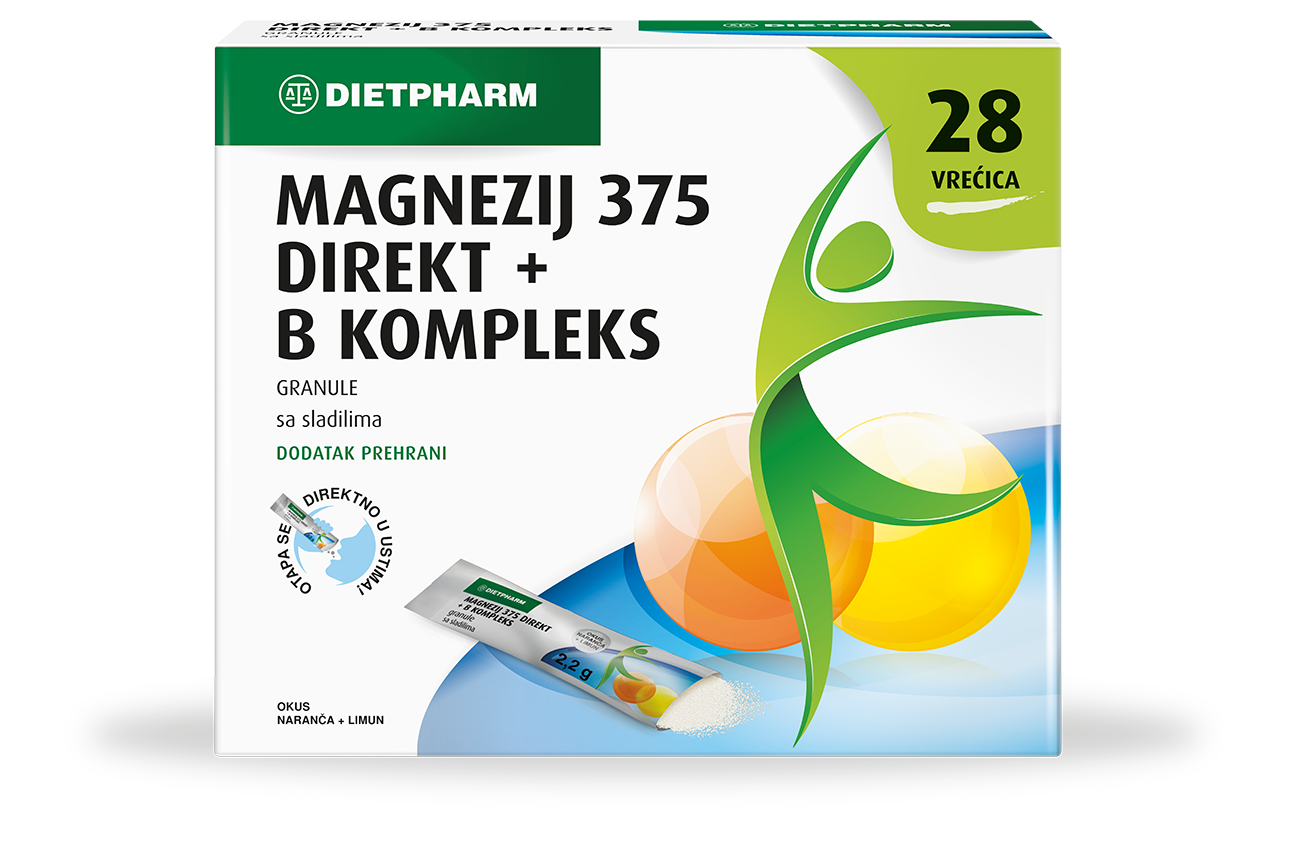Magnesium 375 Direkt + B kompleks granules
Food supplement with magnesium and vitamin B complex in granules.

28 sachets
Food supplement with magnesium and vitamin B complex in granules.

28 sachets
Food supplement with magnesium and vitamin B complex in granular form.
Food supplement with magnesium and vitamin B complex in granular form. Granules dissolve directly in the mouth without the use of water and should not be dissolved in water (liquid).
Magnesium contributes to electrolyte balance, normal muscle function, normal nervous system function and normal psychological function.
Pantothenic acid contributes to normal mental performance.
Thiamine (vitamin B1) promotes normal heart function.
Magnesium, riboflavin (vitamin B2), niacin, pantothenic acid, vitamin B6, folate (folic acid) and vitamin B12 contribute to the reduction of tiredness and fatigue.
Magnesium, thiamine (vitamin B1), vitamin B6 and biotin contribute to normal energy-yielding metabolism.
The package contains 28 sachets.
Orange and lemon flavour.
The product is designed for people who suffer from stress and want to maintain mental functions such as concentration...
The product is designed for people who suffer from stress and want to maintain mental functions such as concentration, learning and reasoning.
The product is also suitable for people who experience tiredness and fatigue, as well as a lack of energy.
It is especially recommended for professional and amateur athletes as it contributes to normal heart, muscle and nervous function.
Adults and children over 12 years old take 1 sachet a day.
Adults and children over 12 years old take 1 sachet a day.
Granules are applied directly into the mouth, and should not be dissolved in water (liquid).
Allow granules to quickly dissolve in the mouth and then swallow.
Magnesium contributes to electrolyte balance, normal muscle function, normal functioning of the nervous system and normal psychological function.
It is the fourth most common mineral in the body with the amount of about 26 g. It is mainly stored in bones (55%) and muscles (27%).
Good sources of magnesium include whole grains, nuts, legumes, potatoes, seafood, raisins and bananas.
Increased demands for magnesium intake occur during pregnancy and breastfeeding as well as during intense muscle activity (physical work, physical recreation, sports).
Reduction diet along with irregular and unvaried nutrition can lead to magnesium deficiency.
Magnesium participates in more than 300 enzymatically-catalyzed reactions as a cofactor.
It plays a role in ion transport, thereby affecting nerve impulse conduction, muscle contraction, and normal heart rate.
Vitamin B1 (thiamine) contributes to the normal function of the heart.
Thiamine pyrophosphate, the active form of thiamine, is a cofactor of several enzymes involved in the metabolism of branched-chain amino acids, and it also plays an important role in carbohydrate metabolism.
Thiamine is involved in the transmission of nerve impulses throughout the body. Rich sources of vitamin B1 include liver, heart, kidneys, eggs, green leafy vegetables, walnuts, legumes, berries, wheat germ.
It is also found in most unprocessed grains. More than 50% of thiamine in raw food will be lost after cooking. The biological value of thiamine can be reduced by food enzymes such as thiaminase (raw fish and shellfish) or by anti-thiamine factors found in coffee and tea.
Pantothenic acid contributes to normal mental performance.
Pantothenic acid is also called vitamin B5.
The active forms of this vitamin are coenzyme A (CoA) and acyl carrier protein (ACP). CoA is involved in the synthesis of sterols, hormones and neurotransmitters and the production of energy from fats, carbohydrates and proteins. Along with ACP plays an important role in the synthesis of fatty acids.
Pantothenic acid is widely distributed in foods. Rich sources of pantothenic acid include meat (chicken, turkey, beef, liver), fish (trout, tuna, cod, salmon), legumes (lentils, soybeans), eggs, whole grains, nuts, and various fruits and vegetables.
| Contains: | The recommended daily dose | ||
|---|---|---|---|
| 1 sachet | % NRV* | ||
| Magnesium (magnesium oxide) | 375 mg | 100 | |
| Thiamine (thiamine hydrochloride) | 3,3 mg | 300 | |
| Riboflavin (riboflavin 5′-phosphate sodium) | 4 mg | 286 | |
| Niacin (nicotinamide) | 35 mg NE | 219 | |
| Pantothenic acid (calcium D-pantothenate) | 15 mg | 250 | |
| Vitamin B6 (pyridoxine hydrochloride) | 4,2 mg | 300 | |
| Biotin (D-biotin) | 100 μg | 200 | |
| Folic acid (pteroylmonoglutamic acid) | 600 μg | 300 | |
| Vitamin B12 (cyanocobalamin) | 7,5 μg | 300 | |
* NRV = nutrient reference value
Magnesium contributes to electrolyte balance, normal muscle function, normal functioning of the nervous system and normal psychological function.
Read more